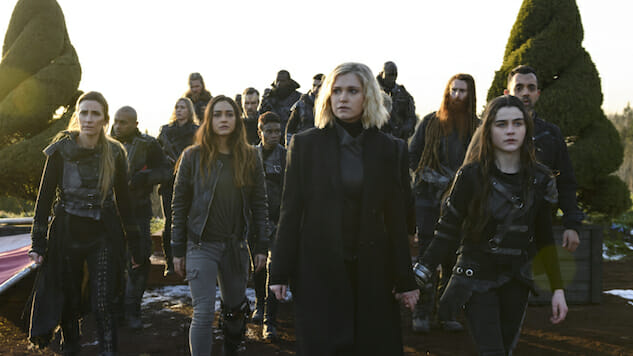Why The 100 Is the Bravest Show in Genre Right Now
Photo Courtesy of The CW
At this point, it feels vaguely impossible to sum up the CW drama The 100 in any sort of succinct way that might make sense to someone who’s never seen it before. But that’s precisely the reason the show is so great: It’s so often hard to quantify, and in the best possible way.
It’s difficult to think of anything on television right now that has reinvented itself as completely and successfully as The 100 has. And not just the once, either. The show has constantly reframed its narrative in virtually every season, playing out humanity’s fight for survival against many different—and increasingly dark—backdrops.
Though the series began as a typical Lord of the Flies-style dystopia in space, it almost immediately started wrestling with bigger, bolder issues like xenophobia, survivor’s guilt, religious fanaticism and colonialism. Its characters, led by a group of teens sent down to re-colonize a possibly radioactive Earth, are all equally complicated and compelling, often forced to make seemingly impossible moral choices on what feels like a daily basis. And its stories are consistently willing to push boundaries on what teen-focused science fiction can be and do, fearlessly exploring every type of genre narrative, from horror stories to political dramas to Hunger Games-esque survival competitions and religious cults.
In subsequent seasons, we find the titular 100—a name that has ultimately become a bit of a misnomer, given that most of the original group has been dead for several seasons—fighting for their lives, friends, and future in a variety of increasingly dark settings. From a mountain stronghold full of human experiments to the capital of a coalition of survivalist clans and an underground bunker where residents are forced into cannibalism, Clarke Griffin and her friends must repeatedly question our basic ideas of humanity, empathy and the lines between right and wrong.
They’ve fought Grounders, Mountain Men, several hundred criminals bused in on an intergalactic transport ship, a sentient AI system and one another. They’ve been to space and back again. People, including most of those that are supposed to be our heroes, have betrayed and lied to those they once promised to love and protect. Main, major characters died. Relationships fell apart. Nothing and no one is safe in this universe, and the show’s breakneck pacing guarantees that all we can do as viewers is try and hang on for the ride.
Season Six just pulled off what is possibly the biggest reset of all, sending its characters 125 years in the future and banishing them from Earth forever after a (third) nuclear apocalypse renders the planet completely uninhabitable. After an extended period in cryosleep, Skaikru and friends ultimately find themselves on a distant, environmentally hostile planet, ruled by a class of immortal body snatchers who’ve convinced their people that they are gods.
Sometimes, it’s hard to believe this show is real.
-

-

-

-

-

-

-

-

-

-

-

-

-

-

-

-

-

-

-

-

-

-

-

-

-

-

-

-

-

-

-

-

-

-

-

-

-

-

-

-








































